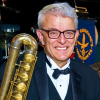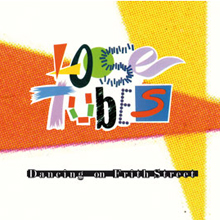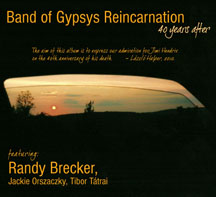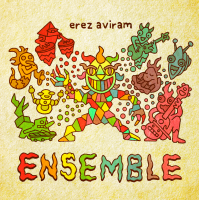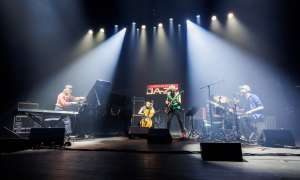Home » Jazz Articles » Jazz That Scratches, Swings and Pops » Vince Giordano: Toe-Tapping and Timeless
Vince Giordano: Toe-Tapping and Timeless
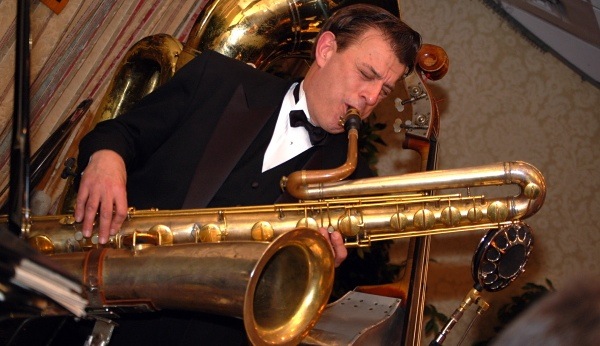
We've all heard King Oliver, Jelly Roll Morton and Bix Beiderbecke on the Smithsonian Jazz Collection. We know the names because they're "important," but do we ever listen because they're just plain good?
What about Oscar 'Papa' Celestin, Red Nichols or Jabbo Smith? Not exactly names jumping out of the radio or iTunes. Save for a precocious thesis or specialty store, the musicians that Louis Armstrong and Duke Ellington listened to, played with or even competed against suffer the same fate as Mozart's rivals or Muhammad Ali's trainer: they're historical curiosities for research, not recreation.
For me the jazz of the twenties and early thirties was never just history. I heard Adrian Rollini's bass saxophone long before Charlie Parker's alto, but they both blow me away for different reasons. "Jazz That Scratches, Swings and Pops" spotlights the early jazz you've heard about or never heard at all, not as something we've moved past, but as an exciting experience that doesn't need a time machine, just some speakers.
This is jazz pre-electric recording, pre-World War II and pre-acceptance into conservatories and Carnegie Hall. Jazz grew up in New Orleans brothels, Chicago speakeasies and brawling Kansas City bars. Never naïve or innocent, the music we'll discuss is simply young, with all of the energy, exploration and occasional embarrassment we associate with the time of our lives when things are unsettled and the world is fresh. If it sounds primitive, check your hindsight at the door. There's a treasure of great music between the cracks and scratches of jazz's youth. —Andrew J. Sammut
A lot of scientists will be disappointed to hear that a musician from New York City has perfected time travel.
Past and present fuse when Vince Giordano and the Nighthawks scorch the bandstand at Sofia's on West 46th Street in Manhattan. Every Monday and Tuesday evening, they serve up the music of the 1920s and early '30s with a passion that makes "revival" the understatement of this or any other decade. There's no mannered dusting off of old tunes, or cliché-ridden mimicry. The music is close to a century old, but the pounding in your feet and heart is timeless.
Whether dancing on the floor or in your seat, the Nighthawks' skill, sincerity and swing sweeps your soul. Even clips on Michael Steinman's website "Jazz Lives" will bring sweat to the brow, maybe a tear to the eye. As the Nighthawks' unofficial videographer for over four years, Steinman has filmed and proselytized for Giordano and other musicians dedicated to this chapter of American music. "For Vince," Steinman comments, "there is an almost religious devotion to making sure the music of the first 40 years of the 20th century is never forgotten."
That devotion translates into a benevolent obsession with authenticity, what Giordano calls "the lost language of the way musicians played in those days." John S. Wilson, of The New York Times, reported on Giordano breaking up his first band to restock it with musicians more in touch with that language. Giordano insists on vintage instruments and warm, rich period tones. Most of the time the Nighthawks burn through solos originally improvised on record. The band's book draws from Giordano's private collection of more than 60,000 pieces of original sheet music, acquired through investigations worthy of a Dan Brown novel. Even when he announces the next number or croons some sweet lyrics of yester-decade, it's into an antique 1930 Kellogg radio microphone. Speaking by phone, from his home in Brooklyn, he illustrates the vibrato Louis Armstrong and Benny Goodman played at the end of notes. He hums "a little mini shake" with the knowledge of a lifelong scholar and the energy of a kid who discovered it yesterday.
Attention to detail makes for impressive scholarship, but not always great music (as classical music occasionally demonstrates). Steinman praises the "spaciousness and energy" of a Nighthawks performance that makes the music not just recreated, but lived and breathed. With the Nighthawks in town, you're not just hearing King Oliver or Bix Beiderbecke; you're hearing Vince and the guys in the band. From Dan Block's piping clarinet, to Jon-Erik Kellso's bravura trumpet, down to Arnie Kinsella's booming drums (on authentic calf skins, rather than synthetics), admiration and creativity cook the whole room.
The audience also feels that fire, as much by Giordano's design as those instruments on the bandstand. Giordano's showmanship, another facet of the early music lost to contemporary jazz's pensive stage presence, is as infectious as his beat. He explains, by phone, "I couldn't shine [clarinetist] Ted Lewis's shoes as a showman," but demonstrates otherwise onstage. Giordano schmoozes with the audience as though he were playing their living room. He rubs his hands next to searing soloists, giddy homage to live musicians and departed entertainers. Giordano even takes requests and thanks the audience for coming. "I want more people to listen to this music," he says. "So if someone saw a Fred Astaire and Ginger Rogers movie last night and they request a song from it, I'll play the tune for them." In a time when jazz musicians keep things cool, Giordano plays hot while keeping the atmosphere warm. The abundant smiles on- and offstage read like a thermostat.
Giordano's smile curves back to when he was he was five years old and discovered this music on original records at his grandmother's house. From there it was on to learning violin, then banjo and guitar, then tuba, string bass and bass saxophone. He joined the musician's union at age 14, but his father still had to drive him to gigs around Long Island, "with banjos and straw hats and sawdust" as described in James Stevenson's touching New York Times profile "The Passion of Vince." In high school, he studied with legendary arranger Bill Challis before touring with the Navy Show Band after graduation. He returned to the U.S. and played mainstream jazz in small combos in Greenwich Village. As he told David French in a 2005 All About Jazz interview, "doing the round robin [the stream of solos approach in modern jazz]" wasn't his thing. "I still enjoy doing [it], but it kind of got played out for me. I would go back to the [old] recordings and say, 'Wow, listen to the discipline'—a combination of orchestrated stuff and loose jazz."
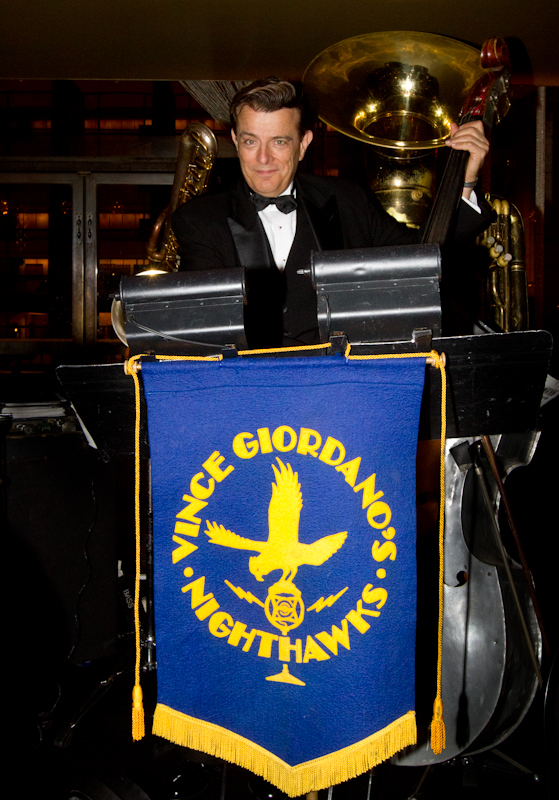 In his twenties, Giordano began his campaign of correspondence for old sheet music, from dance band arrangements to silent movie scores. Giordano left no stone unturned: "Local 802 would publish musicians' obituaries, and I would neatly hand write a form letter (which was hard with my handwriting) asking if I could take any sheet music or old horns off of their hands." Some people would just give it away, others would ask for astronomical sums of money. Unfortunately most would tell him it was already discarded. "Musicians try to stay current, so in the '50s guys would say 'No one is using these old tunes or a tuba anymore, who would want all this stuff we don't play anymore?'"
In his twenties, Giordano began his campaign of correspondence for old sheet music, from dance band arrangements to silent movie scores. Giordano left no stone unturned: "Local 802 would publish musicians' obituaries, and I would neatly hand write a form letter (which was hard with my handwriting) asking if I could take any sheet music or old horns off of their hands." Some people would just give it away, others would ask for astronomical sums of money. Unfortunately most would tell him it was already discarded. "Musicians try to stay current, so in the '50s guys would say 'No one is using these old tunes or a tuba anymore, who would want all this stuff we don't play anymore?'" Playing, collecting and promoting that stuff became a "53 year labor of love" for Giordano, as well as an uphill battle. "I was mocked and taunted in the beginning," he recalls, "people would ask me 'what are you doing with all of this old cartoon music?'" It turns out he was not just preserving it, but keeping it alive and swinging.
Comparing plans for nearby Vitaphone Studios with his beloved tunes, Giordano laments "there's too much history being bulldozed." It's a moving observation that many of us, in the spirit of our era, simply don't make time for. In the age of the perennially new and the quest to be relentlessly forward, Giordano spotlights the once-modern and tears into it like brand new. He doesn't simply remind us that music was once made without amplification and auto-tuning, he shows us how powerful that music still is.
When the band lights into Fletcher Henderson's searing "Shanghai Shuffle," the florid saxophones and slap bass may be period but the technique and drive is eternal. The trumpet solo, the same one Red Allen blasted out on record, is as fresh and daring as it was in '34. On a mile-a-minute "Nagasaki," Giordano's steamroller bass and torrent of vocals illuminate the music of prohibition, short skirts and manic abandon, uninhibited and sexy in the way that keeps "pop" so popular. When he kibitzes with elated dancers, it reinforces the music's connection to feet and other body parts. Buried in the back of the bandstand, behind the metal of his microphone, bass saxophone, tuba and string bass (aluminum, an homage to the instruments of his slap-happy forefathers), Giordano's heartbeat shakes every horn and wineglass.
His heart gets plenty of overtime outside of Sofia's. During the course of this Sunday morning phone interview, he received three other calls for interviews and information. Giordano not only leads the Nighthawks, he's also their publicist, booking agent, equipment manager, audio engineer and librarian. There's no such thing as a day off for Vince Giordano—even Thanksgiving morning will be spent "with a turkey leg in one hand and sheet music in the other. An army of one!" he jokes, as he describes hauling around four hundred pounds of music and his encounters with ticket-happy midtown meter maids. The band will be flying to Iowa's Bix Beiderbecke Festival in August, while Giordano drives down the instruments, equipment and music. After his bass saxophone had to be repaired following a bumpy flight, Giordano avoids letting things out of his sight. "This isn't some science experiment, it's my horn."
Giordano's attention to his sax and a million other details has lifted pop's ancestry out of the archives and onto the public stage. Aside from their residency at Sofia's, the Nighthawks have played everything from Lincoln Center dances to the gala dinner opening of New York City Opera, as well as a slew of private functions. Early radio work on "A Prairie Home Companion" segued into soundtrack credits including Francis Ford Coppola's The Cotton Club (1984), Martin Scorsese's The Aviator (2004), and several of Woody Allen's jazz-inflected films. That's Giordano on bass with Sean Penn in Sweet and Lowdown (1999), behind Kate Winslet and Leo DiCaprio in Revolutionary Road (2008), and, most recently, conducting the band on the original HBO television series, Boardwalk Empire (2010). Giordano puts in double-duty as musical consultant and onscreen bandleader for HBO's decadent tale of Prohibition-era Atlantic City. If he's happy the show just got signed for a second season, it's not just because he loves to work.
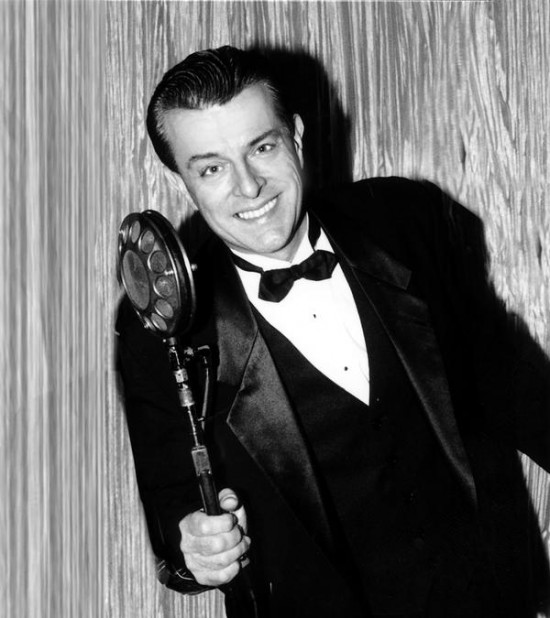 While there's steadier jobs outside of classic jazz, Giordano's spirit resides in bringing the music he loves to wider audiences. When asked how far he'd like to take music that's 80-90 years old, when it's hard to hear last year's hits on the radio, he replies that "people still see and play Mozart, Brahms [and] Beethoven." The allusion to classical music is telling. Classical has moved and inspired generations of listeners, despite its elitist associations with an archaic, foreign tradition. Giordano's repertory doesn't even suffer from the same baggage: it's a thoroughly American heritage and it gets your butt moving. Yet classical music and classic jazz remain small pieces of the music industry's pie, making them vulnerable to market forces.
While there's steadier jobs outside of classic jazz, Giordano's spirit resides in bringing the music he loves to wider audiences. When asked how far he'd like to take music that's 80-90 years old, when it's hard to hear last year's hits on the radio, he replies that "people still see and play Mozart, Brahms [and] Beethoven." The allusion to classical music is telling. Classical has moved and inspired generations of listeners, despite its elitist associations with an archaic, foreign tradition. Giordano's repertory doesn't even suffer from the same baggage: it's a thoroughly American heritage and it gets your butt moving. Yet classical music and classic jazz remain small pieces of the music industry's pie, making them vulnerable to market forces. Labels such as "current" and "marketable" rip apart at the force of Giordano's passion. "We perform knowing we're not going to outsell Lady Gaga, but you have to believe in it." Giordano has played, collected and pushed this music for over five decades. He knows that hearing is believing, when the Nighthawks are in town.
This religious devotion makes Giordano a prophet for a message that's much larger than him or his band. He fondly recalls the 1973 box-office smash The Sting, and how it ignited a brief ragtime craze. "It was a huge hit...Kids taking piano lessons were playing Mozart and also [ragtime composer] Scott Joplin!" For Giordano, the bottom line is getting the music heard. "I wish that someone could see what we're doing and take it to the next rung of the ladder. More attention, more exposure to this music. Take a chance to get it out there, get kids dancing to it."
With the Nighthawks' gamut of talent and Vince Giordano at the helm, don't be surprised if your grandchildren are grooving to the hits of the '20s. Giordano's umpteenth role is as teacher, starting with the "Rosetta Stone" of the recordings and instructing his players from there. In keeping with another tradition of this music, the Nighthawks are a room-rumbling conservatory. We know there's at least eleven other guys who will keep the flame burning, not to mention their students and other musicians in the audience.
Who's going to tell those scientists that this bassist also found a path to the future?
Photo Credits
Page 1: Tony Mottola
Page 2: M. Figg
Page 3: Courtesy of Vince Giordano
Tags
Vince Giordano and the Nighthawks
Jazz That Scratches, Swings and Pops
Vince Giordano
Andrew J. Sammut
United States
New York
New York City
King Oliver
Jelly Roll Morton
Bix Beiderbecke
Papa Celestin
Red Nichols
Jabbo Smith
Louis Armstrong
duke ellington
Charlie Parker
Nighthawks
Benny Goodman
Dan Block
Jon-Erik Kellso
Ted Lewis
Bill Challis
David French
Fletcher Henderson
Red Allen
Scott Joplin
About Vince Giordano
Instrument: Composer / conductor
PREVIOUS / NEXT
Support All About Jazz
 All About Jazz has been a pillar of jazz since 1995, championing it as an art form and, more importantly, supporting the musicians who make it. Our enduring commitment has made "AAJ" one of the most culturally important websites of its kind, read by hundreds of thousands of fans, musicians and industry figures every month.
All About Jazz has been a pillar of jazz since 1995, championing it as an art form and, more importantly, supporting the musicians who make it. Our enduring commitment has made "AAJ" one of the most culturally important websites of its kind, read by hundreds of thousands of fans, musicians and industry figures every month.


